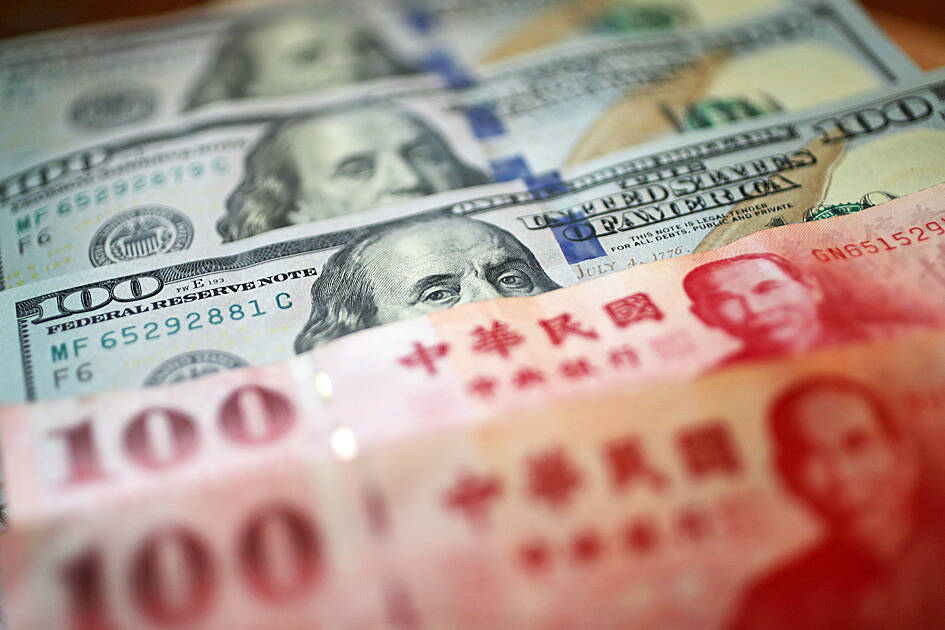The US Department of the Treasury has kept Taiwan on a watchlist of currency manipulators in its semiannual Macroeconomic and Foreign Exchange Policies of Major Trading Partners of the US report.
The report, presented to the US Congress on Friday, reviewed and assessed the policies of major US trading partners, which accounted for about 80 percent of US foreign trade in goods and services, during the four quarters through December last year.
In addition to Taiwan, China, Germany, Malaysia, Singapore, South Korea and Switzerland have also been placed on the currency manipulation watchlist, the US Treasury said.

Photo: CNA
None of Washington’s major trading partners were named as a currency manipulator, it said.
The report uses three criteria to determine which of its trading partners would be named as currency manipulator nations: a significant bilateral trade surplus with the US; a material current account surplus; and involvement in persistent one-sided intervention in the foreign exchange market.
When an economy meets just one of the three criteria for two US currency reports in a row, it is removed from the monitoring list.
The central bank on Saturday said that although Taipei has stayed on Washington’s monitoring list for currency manipulation, both sides have channels to maintain smooth communications.
Taiwan remained on the watchlist because it has a trade surplus of US$51 billion in merchandise and services, and its current account surplus made up 13.3 percent of its GDP during the four quarters through the end of last year, the central bank said.
However, the central bank sold a net US$13 billion from its US dollar reserves, which made up about 1.7 percent of Taiwan’s GDP, and the number of months that the central bank was a net buyer of US dollars was fewer than eight, which did not meet the third criterium of persistent one-sided intervention in the foreign exchange market.
The central bank said it would continue to interact with the US Treasury.
It is unnecessary for Taiwan to worry about bilateral ties with the US just because Taipei was kept on the currency manipulation monitoring list, Taiwan Institute of Economic Research economist Wu Meng-tao (吳孟道) said.
As Taipei and Washington signed their first agreement under the US-Taiwan Initiative on 21st-Century Trade on June 1, which covered customs and border procedures, regulatory practices and small business in a bid to make trade and investment between the two sides easier, Wu said the US Treasury’s move to keep Taiwan on the currency manipulation watchlist is not expected to affect bilateral trade ties.
However, as the US Federal Reserve last week signaled more interest rate hikes before the end of the year, which could continue to boost the US dollar, influence fund flows and affect global financial markets, it is likely to prompt intervention from Taiwan’s central bank in the currency market, Wu said.

Taiwan will prioritize the development of silicon photonics by taking advantage of its strength in the semiconductor industry to build another shield to protect the local economy, National Development Council (NDC) Minister Paul Liu (劉鏡清) said yesterday. Speaking at a meeting of the legislature’s Economics Committee, Liu said Taiwan already has the artificial intelligence (AI) industry as a shield, after the semiconductor industry, to safeguard the country, and is looking at new unique fields to build more economic shields. While Taiwan will further strengthen its existing shields, over the longer term, the country is determined to focus on such potential segments as

UNCERTAINTY: Innolux activated a stringent supply chain management mechanism, as it did during the COVID-19 pandemic, to ensure optimal inventory levels for customers Flat-panel display makers AUO Corp (友達) and Innolux Corp (群創) yesterday said that about 12 to 20 percent of their display business is at risk of potential US tariffs and that they would relocate production or shipment destinations to mitigate the levies’ effects. US tariffs would have a direct impact of US$200 million on AUO’s revenue, company chairman Paul Peng (彭雙浪) told reporters on the sidelines of the Touch Taiwan trade show in Taipei yesterday. That would make up about 12 percent of the company’s overall revenue. To cope with the tariff uncertainty, AUO plans to allocate its production to manufacturing facilities in

COLLABORATION: Given Taiwan’s key position in global supply chains, the US firm is discussing strategies with local partners and clients to deal with global uncertainties Advanced Micro Devices Inc (AMD) yesterday said it is meeting with local ecosystem partners, including Taiwan Semiconductor Manufacturing Co (TSMC, 台積電), to discuss strategies, including long-term manufacturing, to navigate uncertainties such as US tariffs, as Taiwan occupies an important position in global supply chains. AMD chief executive officer Lisa Su (蘇姿丰) told reporters that Taiwan is an important part of the chip designer’s ecosystem and she is discussing with partners and customers in Taiwan to forge strong collaborations on different areas during this critical period. AMD has just become the first artificial-intelligence (AI) server chip customer of TSMC to utilize its advanced

Chizuko Kimura has become the first female sushi chef in the world to win a Michelin star, fulfilling a promise she made to her dying husband to continue his legacy. The 54-year-old Japanese chef regained the Michelin star her late husband, Shunei Kimura, won three years ago for their Sushi Shunei restaurant in Paris. For Shunei Kimura, the star was a dream come true. However, the joy was short-lived. He died from cancer just three months later in June 2022. He was 65. The following year, the restaurant in the heart of Montmartre lost its star rating. Chizuko Kimura insisted that the new star is still down